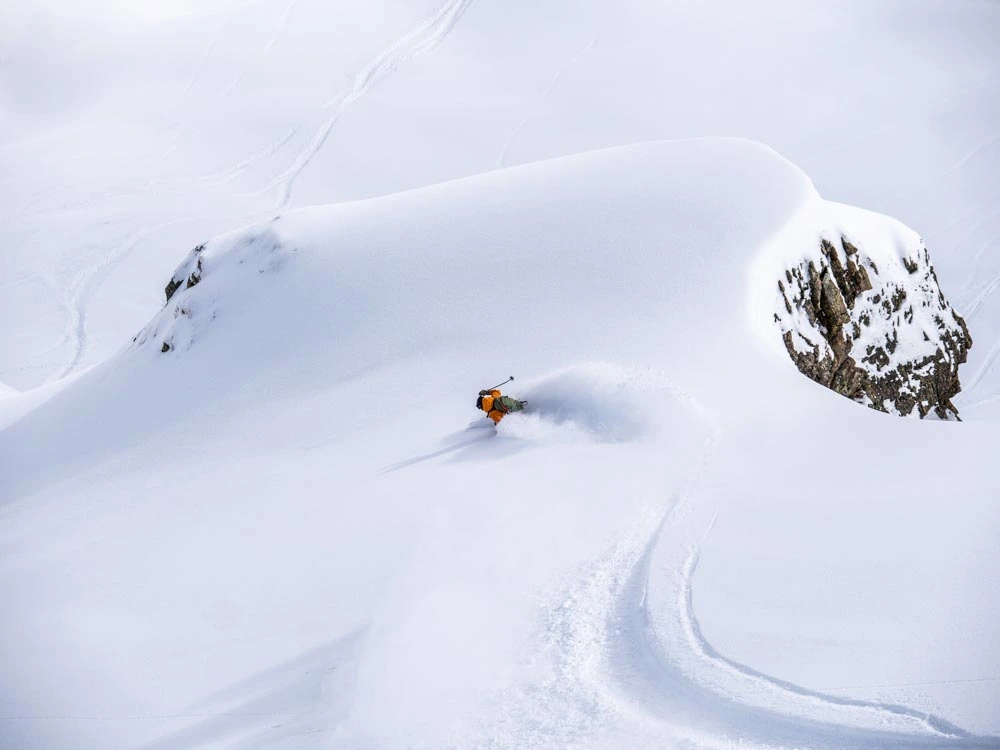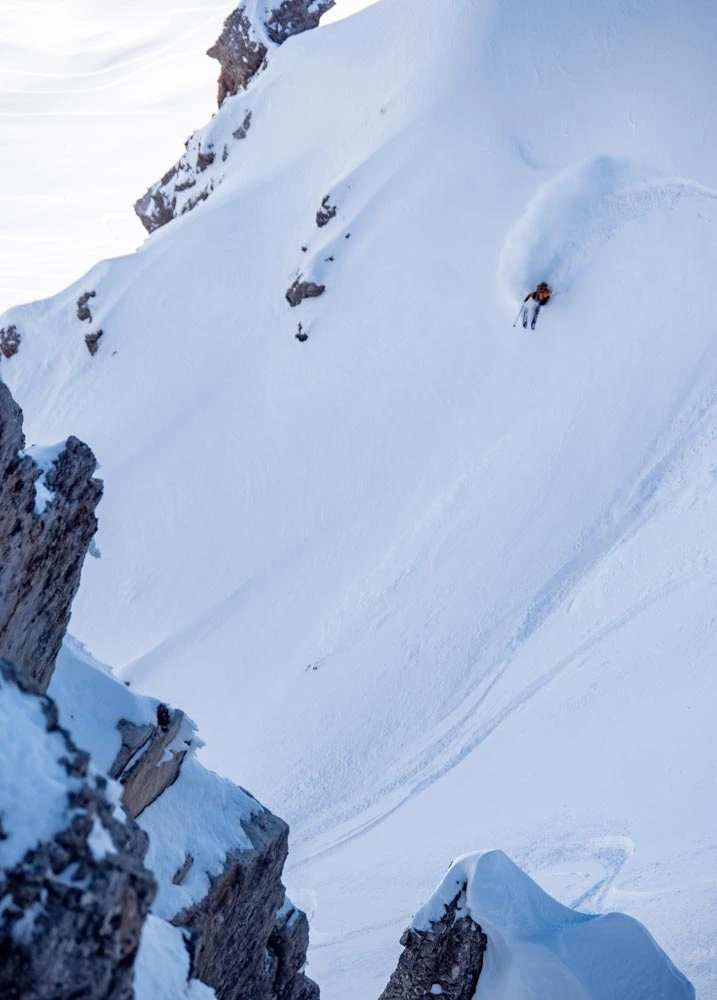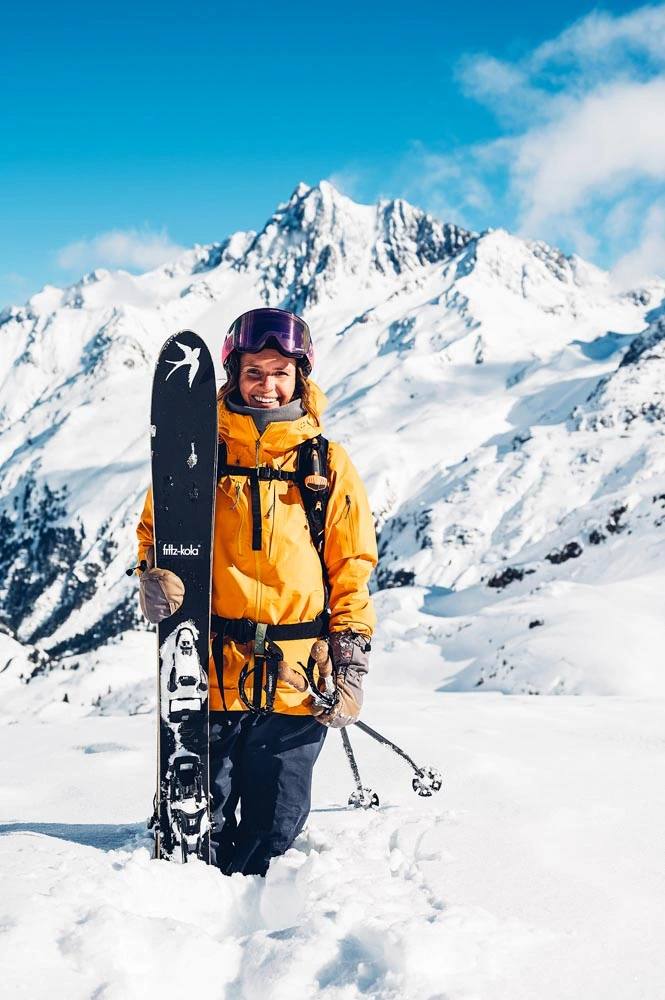Ski Chatter with Lena Stoffel


Nicola Iseard talks to Lena Stoffel – freeskier, filmmaker, adventurer and POW Austria ambassador – about her passions, her latest projects and finding beauty close to home
Nicola Iseard: How did you first get into skiing?
Lena Stoffel: I come from the Upper Swabian Allgäu, from a small village near Leutkirch im Allgäu, Germany. My parents are passionate skiers – they are both qualified ski instructors – and they put me on skis in the garden when I was two. So I grew into skiing from a young age and it was always a natural part of life.
You did a lot of racing at the beginning of your career. How did you switch to freeride and freestyle?
As I grew up, I got into alpine racing, and in my teens joined the junior national team. However, after graduating from high school, I didn’t want to just ride through poles and so decided to take a different path. I went to Innsbruck to study and got into the freeride and freestyle scene there and grew with it. I participated in regional contests during my studies and, little by little, started branching out into more international events. In 2010 I competed in Slopestyle at the X-Games in Tignes and finished fifth.
When and why did you turn your back on the contest scene?
In 2011 I unfortunately had my first cruciate ligament and meniscus injury. I fought my way back and was on my way to qualify for the 2014 Winter Olympics in Sochi. But then a second knee injury on the same knee intervened in 2013. The following winter, I decided not to compete anymore and to ski the way I like best – in open terrain and deep snow. I completed my state ski instructor qualifications that season and then went to Norway in the spring with Aline Bock [a German freeride snowboarder] for a film project – Way North came about as a result. We somehow hit the mark and the film was really well received. Combining two women, skiing, snowboarding and surfing didn’t exist that much back then. It opened the door for both of us to embark on more filming projects in the years after.


These film projects mainly follow you into the backcountry. What is it about skiing off-piste that excites you so much?
It’s the nature, the mountains and the peace. Not skiing among crowds and going in search of beautiful mountains to ski down. Optimally, in deep snow, of course!
One of the projects you were recently involved in, Vanishing Lines, came out last winter and is about more than just skiing. Can you tell us more about that?
Yes, that was a great film project and I was happy to be a part of it. The idea came from Mitch Tölderer, an Innsbruck snowboarder who is experiencing first-hand the change that is happening here in the mountains of the Tyrol. The film is about protecting the last wild nature. This is told with the example of the plans that existed for the merger of the Pitztal and Ötztal glaciers. Thank God I can say ‘existed’, because these plans are now no longer on the table due to citizens’ initiatives and petitions.
How is this portrayed in the film?
You see frightening images of large construction sites in wild natural areas, contrasted with beautiful shots of Mitch skiing a gully in the Karwendel, and me having great ski runs in the Kalkkögeln. Glaciers are highly sensitive and beautiful ecosystems and great water reservoirs. That’s why it’s important to protect them.
So do you think we should stop using lifts for skiing altogether?
No, I don’t think so. I think it’s really great the opportunities we have in ski resorts. They bring people to the mountains and make them accessible to many. People see the beauty of the nature of the high alpine landscapes and I think that’s an opportunity to actively involve these people in conservation. I’m just in favour of responsibly improving what’s already there, and not building more and more [lifts]. After all, we have enough kilometres of slopes. I do think we should try to support the small ski resorts as much as we can, and not just go skiing in the bigger, more famous areas.
How do you look at travelling and the environmental impact of moving around the globe to seek out snow – a finite resource under threat from climate change?
I love skiing different mountains around the world and learning about different cultures. I always feel privileged to be able to show these places in their true magic and how beautiful they are, through my eyes and through the position I am in, as a skier. Therefore, I want to inspire people to travel responsibly, support local businesses and leave places as they found them. On the other hand, I get the contradiction. Snow as a finite resource is definitely under threat and travelling for long distances to find it, especially by plane, really aggravates the whole thing. As much as travelling has shaped me and my connection to nature, especially in Japan and Norway, I can always find this beauty at home as well. So I’m trying to minimise my own impact, ski locally as much as I can, and show through my work how important it is to protect the mountains.
You recently became Vice President of Protect Our Winters (POW) Austria. Why are you involved in POW and what does their work involve?
I’ve been an ambassador for POW for a long time. It was a fundamental need for me to get involved with an NGO that tries to bundle the natural interests of all mountain and winter sports enthusiasts, and thus also protect all of our playgrounds. The work is mainly characterised by positive communication and raising awareness. We want to get all outdoor enthusiasts on board and give this community a common, strong voice. Important issues for us include direct lobbying with policy makers and educational initiatives. We run school workshops called ‘Hot Planet, Cool Athletes and POW ambassadors are heavily involved in these – they are role models and cool ‘climate protectors’.
How can we join or support you at POW? Are you active internationally?
On the POW website you can easily become a member and find out how you can get involved. And yes, POW is international. There is a community in many cities that meets regularly, in places such as Munich, Innsbruck and Graz, as well as across Europe and around the world.
How do you recognise the climate crisis in your exposure to winter seasons all over the world?
I recognise it through the abnormal weather patterns we are experiencing. Everywhere I travel to, and in talking to locals, it seems that winters are increasingly extremely dry one year, then the other extreme the next year, with intense snowfall. While I’m always looking for snowfall or waves, it seems that the usual weather patterns are changing or simply disappearing. Most prominently, I can see the changes on my doorstep, in Innsbruck, as the Stubai Glacier continues to retreat.
What projects do you have coming up next?
I have a trip planned to Piermont for a photo essay to take place in a valley that has no lifts and is particularly rich in tradition. It is a ski touring paradise – when there is snow. I just try to spend as much time as possible in the mountains, that’s where I get inspiration for my personal projects, as well as for my work with POW.
Lena Stoffel is an ambassador for Patagonia